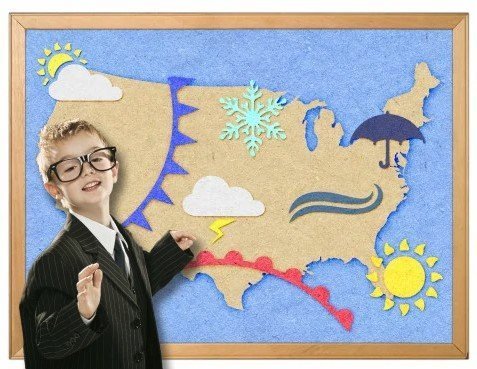In this section we will discuss:
- What a Meteorologist does and who do they work for
- What education a meteorologist need
- How the Military needs meteorologists and how they are trained
- How to become a meteorologist with a home weather station

A meteorologist is a scientist who studies weather and the atmosphere. They work for government agencies, private business, in education, consulting and research services, and for TV and radio stations. The public is most familiar with meteorologists who provide weather forecasting in media.
Most professional meteorologists will attain a four-year college degree in meteorology or a related science. The course of study will be heavy on math because modern weather forecasting depends upon compiling data from hundreds or thousands of observation sites then creating and analyzing computer models based on the data.
If you plan on studying meteorology, it is best to start in high school. If your school offers calculus, computer programming and physics courses, you can start college ahead of the game. If you just want a straightforward and funny tool for your kid to start with, check out the Scientific Explorer Wacky Weird Weather Kit. We guarantee that both you and your child will have a ton of fun with this game.
Scientific Explorer Wacky Weird Weather Kit

Another option to receive the latest “Hands On” meteorological training is through military service. Both the US Navy and Air Force require up to date and accurate local weather information to accomplish their missions. Both services use enlisted specialists to collect and interpret both locally collected weather data as well as satellite data.
An enlisted weather specialist will be required to complete Enlisted Basic Military Training (“Boot Camp”) for their service, and then attend a specialized technical school. The Navy’s Aerographer’s Mate (AG) Class A Technical School and Air Force Weather Specialist technical training is held at Keesler AFB, Mississippi. Your local Military recruiter can provide more detailed career information.
Many of the instruments that a professional meteorologist uses are just like the ones that come with a home professional weather station. In fact, many weather hobbyists are able to connect their weather stations to a central data collection point so that weather scientists can use the data collected by amateurs for weather modeling and forecasting.
Review Quiz:

- Q1: Why is studying math so important for meteorologists?
- Q2: What are two military enlisted career specialties that work with weather and gathering meteorological data?
Answers:
- A1: Meteorology is a science of observation, and the most efficient and accurate way to make sense of the thousands of data points gathered around the world each day is through complex computer-based mathematical models.
- A2: Air Force Weather Specialists and Navy Aerographer’s Mates.
